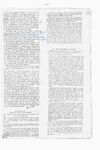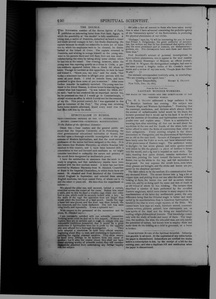< Henry Cornelius Agrippa (continued from page 1-100) >
grapher to the Emperor Charles V. Henry VIII. of England and Margaret of Austria competed for the favor of his attachment to their respective courts. At the age of twenty, so great was his reputation as an alchemist, that the principal adept of Paris wrote to Cologne to invite him to settle in France, and aid them with his experience in discovering the philosopher's stone. (See Mackay's “Popular Delusions"). Although he was believed to have the secret of the transmutation of metals, he lived and died in poverty, as all true adepts of Occultism have before and since his time.
The stories which are told of his power to evoke spirits are most wonderful, and Mr. Peebles quotes one of these (from See Goodwin’s “Lives of the Necromancers”), in his “Seers of the Ages ;” although he omits to give where are find the name of the Earl of Surrey, at whose request he called up the shade of Tully, upon the occasion noted, and made it repeat his celebrated oration for Rocius.
For Sir Thomas More, Agrippa caused to appear in a dream the whole destruction of Troy; to Thomas Lord Cromwel he exhibited in a magic mirror King Henry VIII. and all his lords hunting in Windsor Forest; to Charles V. he showed a number of historical personages of a former age, whom the Emperor wished to see. Mackay tells as that according to his contemporaries: “He could turn iron into gold by his mere word. All the spirits of the air and demons of the earth are under his command, and bound to obey, him in everything- He could raise from the dead the forms of the great men of other days, and make them appear in their habit as they lived, to the gaze of the curious who had courage enough to abide their presence."
In the Retrospective Review (Vol. XIV., for 1826), we find an article reviewing his work on “The Vanitie and Uncertaintie of Arts and Sciences," in which is included a list of his works as follows: “A Treatise on the Excellency of Women,” 1529; “A Sketch of the History of the Government of Charles V.;” and “On the Vanities of the Sciences,” in 1530; “On Occult Philosophy,” in 1530; “A Commentary on the Arts of Raymund Lullius”—another highly celebrated occultist, who was born in Majorica, A. D. 1235—; “A Dissertation on Original Sin;” An Essay on Marriage;” and several books of letters to various persons.
In concluding his very lengthy and expansive article, the writer of the Retrospective Review says that every chapter of the volume in hand “is a storehouse of knowledge, collected, not as in our degenerated days, from sources provided by a profusion of works of reference, but sought out by persevering labor from mines of literary lore, in ins time rare, expensive, and difficult of access.” “In a word,” says he, “we close the volume with the highest respect for our friend Cornelius, who notwithstanding many faults of style and paradoxical views, has produced a work replete with deep knowledge of the world and human nature.”
Peering info the Hidden
...
Spiritualism in Russia
To the Editor of the Spiritual Scientist:
Dear Sir: —Your readers and the general public are aware that the Imperial University of St. Petersburg, the chief governmental educational institution of Russia, had decided upon a thorough scientific investigation of the phenomena of Modern Spiritualism, and that the most eminent professors of the nation had been assigned to the duty. It is also known that Madame Blavatsky, an erudite Russian lady resident in this country, and I, have been honored with a commission to test and forward such mediums as we might consider best fitted to exemplify the nature and potency of the occult force designated as mediumistic power.
I have the satisfaction to announce that the work is already in progress, and that satisfactory results have been attained with the first medium tested. A letter has just been received by Madame Blavatsky from M. Aksakof, Councillor of State in the Imperial Chancellery, in which these facts are stated. M. Aksakof and Prof. Boutlerof of the University visited England in September, and selected from among English mediums, two boys named Petty, of whom one is 13 and the other 17 years old. He describes the experiment as follows: —
We placed the elder one, well secured, behind a curtain, stretched across the corner of the room. Before him stood a table, and on this we fixed a wooden cage about one cubic foot in site, which could be securely locked with a key. In the walls of the cage the apertures were not larger than would admit the insertion of a lead pencil. Inside the cage a hand bell was placed, and the door was then locked, the key removed, and the room darkened. The bell was soon rung loudly and repeatedly. It was a splendid test!
With respect to the personnel of the committee and its plans, M. Aksakof says; —
I am extremely satisfied with our scientific committee. Nothing more could be desi ed in this respect Without exception they are so amiable and so ready to comply with any reasonable conditions demanded, that it would be a great misfortune if Spiritualists were not to profit by the opportunity now offered for a thorough investigation. . . . They have adopted a resolution to hold forty official seances, beginning about May 13 next, and continuing to September I, omitting the regular summer vacation. They allow twenty of these forty sittings to be failures from one cause or another; but if after the course closes they shall not have found anything worthy of scientific notice, they will consider themselves absolved from, undertaking any further inquiry ink the subject.
He adds a fact of interest to those who have taken exception to what I have advanced concerning the probable agency of the “elementary spirits” of the Rosicrucians, in producing the physical phenomena of our circles.
"Perhaps,” says he, “it will be interesting for you to know that Prince A. Dolgorouky, the great authority of mesmerism, has written me that he has ascertained that spirits which play the most prominent part at seances, are elementaries — gnomes, etc. His clairaoyants have seen them and describe them thus.”
<... continues on page 1-102 >
Footnotes
Sources
-
Spiritual Scientist, v. 3, No. 7, October 21, 1875, p.79


